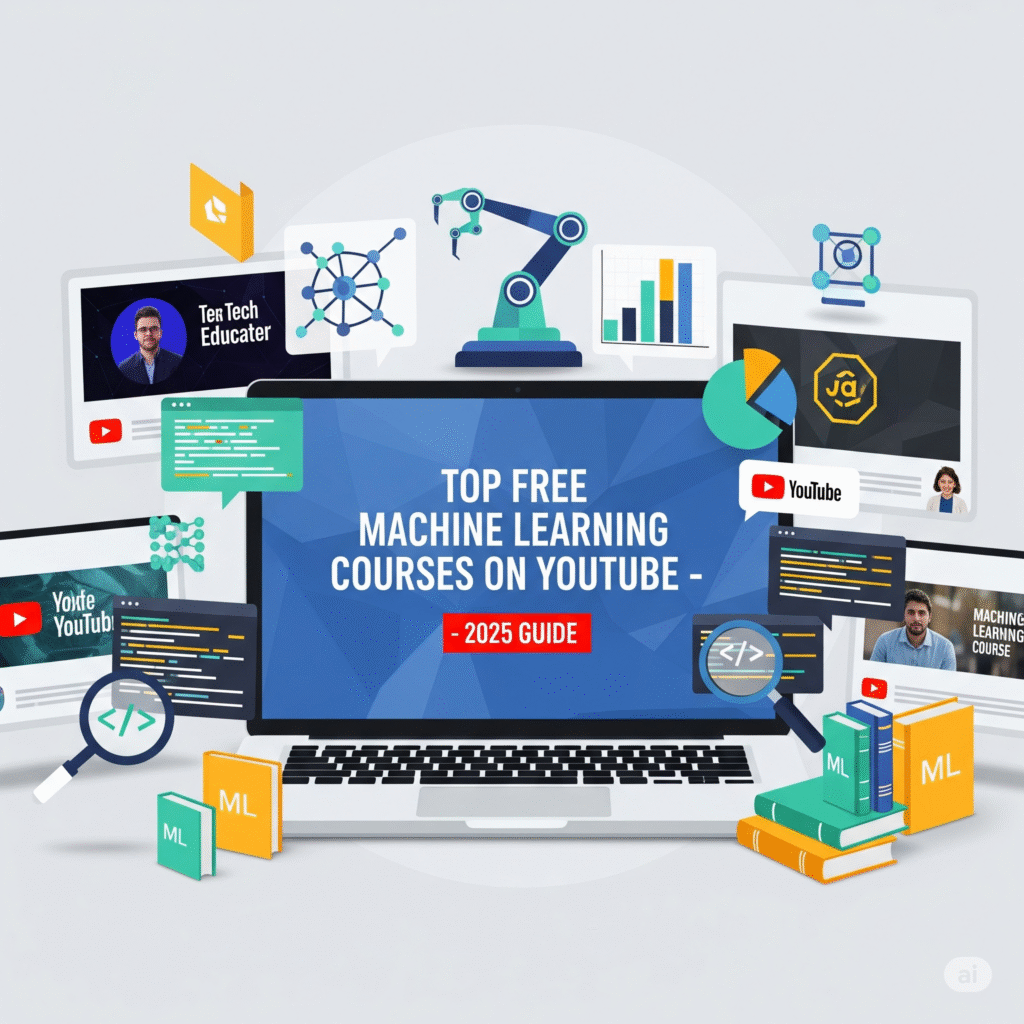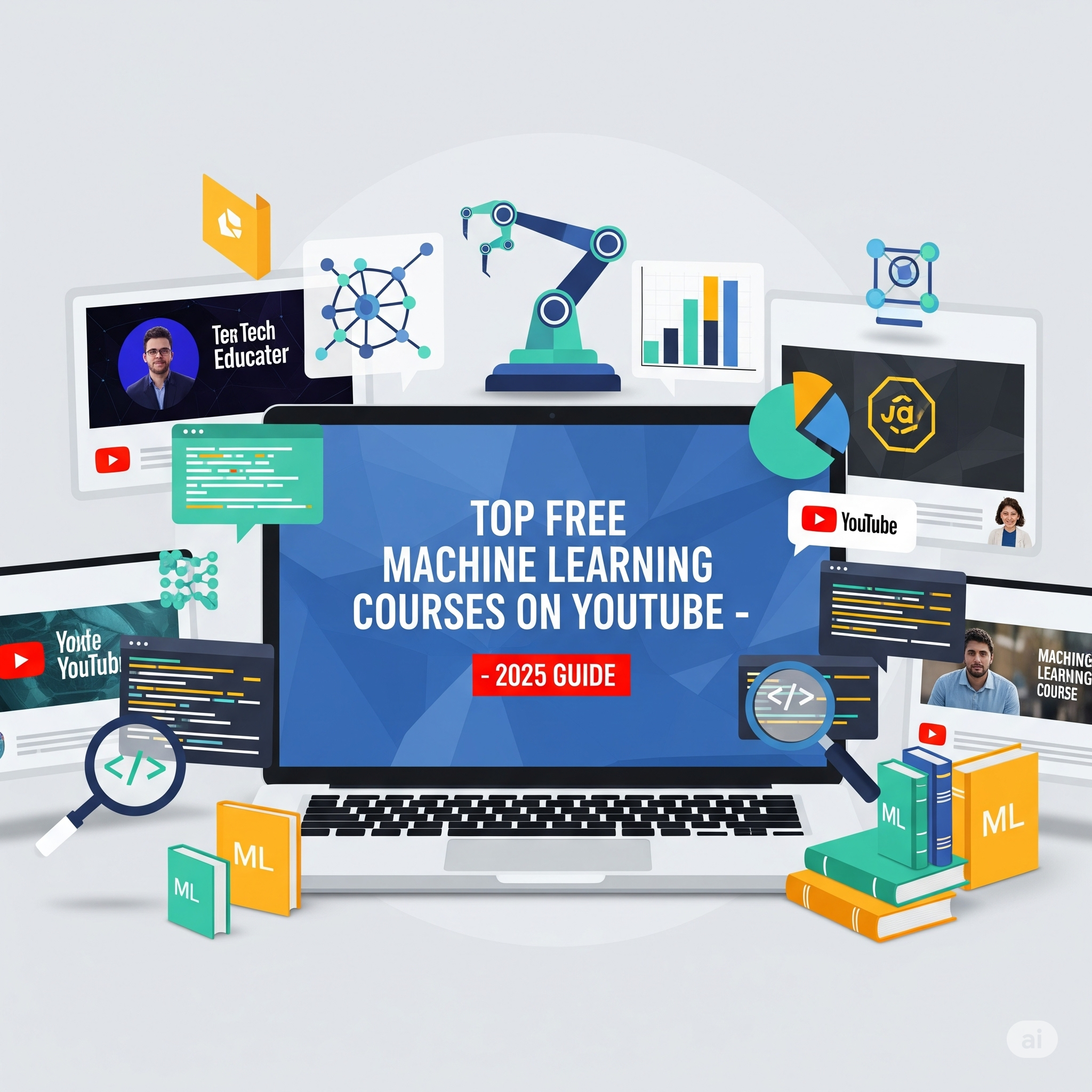If you’re serious about learning machine learning but don’t want to spend thousands on bootcamps or degrees, YouTube offers some of the most valuable university-level courses completely free. From beginner-friendly introductions to advanced statistical modeling, these courses are taught by professors at Caltech, Stanford, MIT and top European universities.

In this guide, we highlight nine of the best free machine learning courses available on YouTube, complete with direct links, learning outcomes and who each course is best suited for.
Table of Contents
1. Caltech CS156: Learning from Data
Instructor: Prof. Yaser Abu-Mostafa
University: California Institute of Technology (Caltech)
Level: Intermediate
YouTube Link: Watch the course
Overview:
Taught by Caltech Professor Yaser Abu-Mostafa, this course offers a rigorous introduction to machine learning, balancing theory and practice. It covers key concepts such as generalization, bias-variance tradeoff, VC dimension, and model complexity. Ideal for understanding both the mathematical foundations and real-world applications of ML across science, engineering, and business.
Best For: Students seeking a strong theoretical foundation in machine learning with an emphasis on learning principles over toolkits.
2. Stanford CS229: Machine Learning
Instructor: Andrew Ng
University: Stanford University
Level: Intermediate to Advanced
YouTube Link: Watch the course
Overview:
Led by Andrew Ng, this course offers a deep and rigorous introduction to machine learning. It covers supervised learning (logistic regression, neural networks, SVMs), unsupervised learning (clustering, dimensionality reduction), learning theory (bias-variance, regularization), and an intro to reinforcement learning. Real-world applications include robotics, speech recognition, bioinformatics, and web data processing.
Best For: Learners with a strong math background aiming for research, grad school, or advanced industry roles.
3. Making Friends with AI
Instructor: Cassie Kozyrkov (Chief Decision Scientist, Google)
Level: Beginner (Non-Technical)
YouTube Link: Watch the course
Overview:
This course is designed to explain ML concepts without coding or mathematics. It’s ideal for professionals, decision-makers, and beginners who want to understand what machine learning is and how it fits into business and product strategy.
Best For: Product managers, startup founders, and newcomers looking to grasp ML fundamentals without diving into code.
4. Applied Machine Learning
Instructor: David Lillis
Level: Beginner to Intermediate
YouTube Link: Watch the course
Lecture Notes: View Notes
GitHub Materials: View on GitHub
Overview:
This practical, code-first course from Cornell Tech starts with ML fundamentals and walks through the full pipeline—from preprocessing and model training to evaluation and debugging. All materials are interactive, with lecture slides in executable Jupyter notebooks and hands-on code implementations using Python, NumPy, and scikit-learn. The course also dedicates several lectures to real-world ML techniques like error analysis, loss curve visualization, and model diagnostics.
Best For: Aspiring data scientists, machine learning engineers, and Python developers looking to apply machine learning in real-world projects.
5. Introduction to Machine Learning (University of Tübingen)
University: University of Tübingen, Germany
Level: Intermediate
YouTube Link: Watch the course
Overview:
Originally recorded during the 2020–21 winter term, this course by Dmitry Kobak offers a structured and academic introduction to machine learning. It covers essential topics including regression, classification, regularization, optimization, clustering, and dimensionality reduction. The course emphasizes core mathematical concepts and is particularly suitable for students from neuroscience and scientific disciplines with a solid foundation in calculus, probability, and linear algebra.
Best For: Academic learners, science and engineering students, and anyone seeking a theoretical introduction to classical machine learning algorithms.
6. Machine Learning Lecture (Stefan Harmeling)
Instructor: Prof. Stefan Harmeling
University: Heinrich Heine University Düsseldorf
Level: Advanced
YouTube Link: Watch the course
Overview:
This course dives deep into statistical ML, including derivations, algorithmic complexity, and theoretical principles. It’s mathematically intensive and suitable for research-minded students.
Best For: Advanced learners and graduate students who want to explore the theoretical underpinnings of machine learning.
7. Statistical Machine Learning (Tübingen)
University: University of Tübingen
Level: Advanced
YouTube Link: Watch the course
Slides: 2020 Slides | 2022 Updated Slides
Overview:
Taught by Prof. Ulrike von Luxburg, this course provides a comprehensive overview of statistical machine learning, focusing on foundational methods and theoretical principles. It covers probabilistic models, maximum likelihood estimation, Bayesian inference, kernel methods, and graphical models. The content is mathematically rigorous and designed for master’s students in computer science and related disciplines.
Best For: Advanced students and researchers who want to deeply understand the intersection of statistics and machine learning theory.
8. Probabilistic Machine Learning (Philipp Hennig)
Instructor: Prof. Philipp Hennig
University: University of Tübingen
Level: Advanced
YouTube Link: Watch the course
Overview:
This advanced course by Philipp Hennig introduces a modern take on Bayesian machine learning, combining probabilistic modeling with tools like automatic differentiation and numerical linear algebra. It focuses on integrating uncertainty estimation into core ML models including deep neural networks using Gaussian processes, probabilistic inference, and probabilistic numerics. The approach is both theoretical and practical, suited for those looking to extend ML systems with probabilistic reasoning.
Best For: Advanced learners, PhD students, or professionals aiming to specialize in Bayesian machine learning, probabilistic modeling, or uncertainty quantification.
9. MIT 6.S897: Machine Learning for Healthcare
University: Massachusetts Institute of Technology (MIT)
Level: Intermediate to Advanced
YouTube Link: Watch the course
Overview:
Focuses on real-world ML applications in healthcare, including topics like model interpretability, fairness, clinical risk prediction, and dealing with missing data.
Best For: Data scientists, healthcare professionals, and ML researchers working on clinical applications.
Conclusion: Which Course Should You Start With?
Your ideal starting point depends on your background and goals.
If you’re a complete beginner or non-technical learner, start with Making Friends with Machine Learning for a clear, jargon-free overview. If you’re aiming for a strong academic foundation, go with Caltech CS156 for theory or Stanford CS229 for both depth and breadth.
For those interested in building real-world projects, Applied ML is a great hands-on option using Python. And if your focus is on healthcare or biomedical applications, MIT’s ML for Healthcare offers specialized knowledge not often covered elsewhere.
Advanced learners or those pursuing research should consider Statistical ML or Probabilistic Machine Learning from Tübingen for in-depth coverage of Bayesian and statistical methods.
Start with the course that best matches your current level and commit. These free resources offer everything you need to build a serious foundation in machine learning.
Related Reads
500+ AI Agent Projects: The Ultimate Collection for Developers, Researchers and Builders


2 thoughts on “Top 9 Free Machine Learning Courses on YouTube – 2025 Guide”